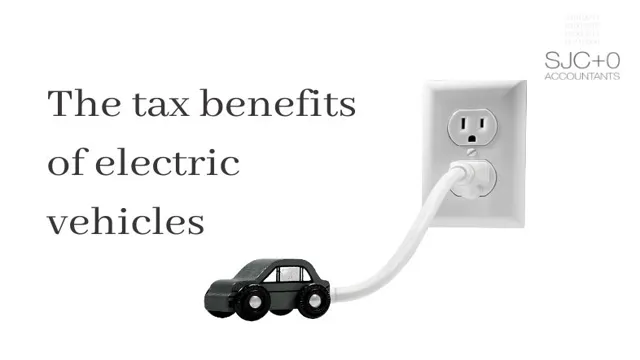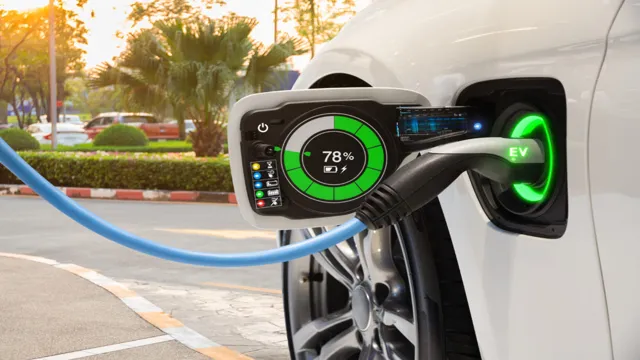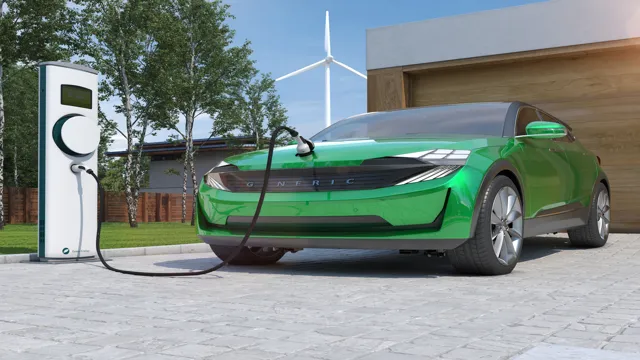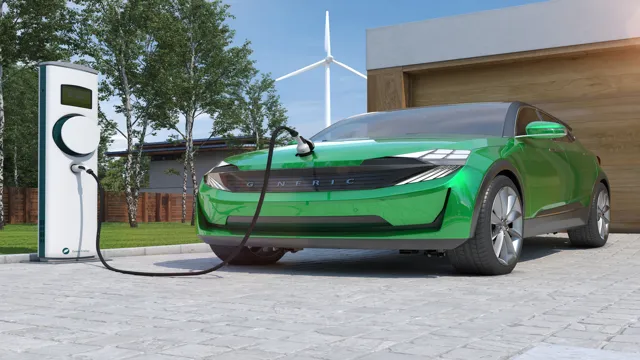Maximizing your Bottom Line: Explore the Lucrative Tax Benefits of Electric Company Cars
Electric cars have been rapidly gaining popularity in recent years, not only for their environmental benefits but also because of the financial incentives that come along with them. One of the major advantages of owning an electric car is the tax benefits that companies can avail themselves of when they use electric cars for their business transportation needs. These benefits can vary from country to country, and even from state to state, but they provide a considerable cost-saving opportunity for companies that take advantage of them.
In this blog post, we’ll delve into the tax benefits of electric company cars, explore the eligibility criteria, and see how businesses can take advantage of these benefits to save significant amounts of money.
Overview of Tax Incentives
If you’re in the market for an electric company car, there are a variety of tax incentives available that can help offset the initial purchase cost and ongoing operating expenses. Federal tax benefits for electric company cars include a $7,500 tax credit for new vehicles and a $2,500 tax credit for used vehicles. Additionally, many states offer their own tax incentives, such as sales tax exemptions, income tax credits, and rebates.
These tax benefits can significantly reduce the cost of ownership and make electric company cars a financially attractive option. Not only can you save money, but you’ll also be helping the environment by reducing greenhouse gas emissions. So if you’re considering an electric company car, be sure to explore all of the tax incentives available to you.
Federal Tax Credits
Federal tax credits are tax incentives provided by the government to taxpayers who meet certain criteria. These credits reduce the amount of tax owed, and sometimes result in a refund. There are many different types of federal tax credits available, including those for individuals and businesses.
Some common individual tax credits include the Earned Income Tax Credit, the Child Tax Credit, and the American Opportunity Tax Credit. Business tax credits are available for a range of activities, including research and development, energy efficiency, and hiring certain categories of employees. While tax credits can be a helpful way to reduce your overall tax burden, it is important to carefully review the specific requirements for each credit to ensure that you are eligible.

State and Local Incentives
State and local tax incentives are government initiatives that aim to boost economic development by offering tax credits, exemptions, and other financial benefits to individuals and businesses. These incentives are used to attract and retain businesses, stimulate job creation, and promote investment. State and local tax incentives vary depending on the state and locality, and they often target specific industries or activities, such as renewable energy, research and development, and tourism.
Some incentives are available to all businesses, while others are only available to small businesses or those in certain geographic areas. Businesses seeking these incentives must often meet certain requirements, such as creating new jobs or investing in capital equipment. Overall, state and local tax incentives can be an effective tool for promoting economic growth and development, and they are worth considering for businesses looking to expand or relocate.
Qualifying for Tax Benefits
If you’re considering buying an electric car for your company, there are several tax benefits you may qualify for. One of the most significant benefits is the federal tax credit, which can be worth up to $7,500 per vehicle. To qualify for this credit, your car must meet certain criteria for battery size and range.
Many states also offer their own tax incentives, such as rebates or exemptions from sales tax. However, these benefits vary widely by state and sometimes even by utility provider. Some states also offer additional perks, like access to carpool lanes or reduced rates for charging at public stations.
To make sure you’re taking full advantage of all available tax benefits, it’s important to do your research and seek out professional advice if needed. By investing in electric cars for your company, not only can you save money on fuel and maintenance costs, but you can also take advantage of valuable tax benefits and help reduce your carbon footprint.
Vehicle Eligibility Requirements
To claim tax benefits for your vehicle, it needs to meet specific eligibility requirements. The vehicle must be primarily used in your business operations and be owned or leased by your business. Additionally, the vehicle must be used for qualified purposes, including transportation of goods, equipment, or passengers as part of your business operations.
Personal use of the vehicle is subject to limitations, and you must keep accurate records of the vehicle’s usage to support your tax deduction claim. Furthermore, vehicles subject to high depreciation deductions, such as luxury cars, have special rules and additional limitations. Ultimately, qualifying for tax benefits for your vehicle will depend on various factors unique to your business, so it is important to consult a tax professional for guidance.
Usage and Business Requirements
Small businesses qualify for a range of tax benefits designed to alleviate the burden of taxes and encourage growth. In order to qualify, certain criteria must be met. First and foremost, the business must be organized as a sole proprietorship, partnership, limited liability company, or S corporation.
These structures allow for pass-through taxation, where the business’s income is taxed on the individual tax returns of the owners. Additionally, the business must have a net profit and actively engage in business activities. This means that the business must have a reasonable expectation of earning a profit and not simply exist for personal enjoyment or hobby purposes.
Furthermore, the business must comply with all relevant tax laws and regulations, including filing all necessary tax forms on time. By meeting these requirements, small businesses can take advantage of tax breaks such as the qualified business income deduction, startup expense deduction, and employer tax credits for health insurance and retirement plans. These benefits not only reduce the amount of taxes owed but also allow small businesses to reinvest in themselves and promote growth.
Real-Life Examples
If you’re considering purchasing an electric company car, you could be eligible for some significant tax benefits. In fact, there are several examples of companies taking advantage of these benefits and reaping the financial rewards. For instance, Siemens has introduced electric vehicles into its UK car fleet and has seen a 50% reduction in CO2 emissions.
Additionally, Thames Water has invested in electric fleet vehicles, resulting in a 70% reduction in NOx emissions. These are just a few examples of how utilizing electric company cars can not only benefit the environment but also provide tax incentives for businesses. By taking advantage of these incentives, companies can save money while simultaneously investing in a more sustainable future.
Overall, it’s a win-win situation for everyone involved.
Case Study: XYZ Company’s Savings
As a real-life example, let’s take XYZ Company, which managed to increase their savings drastically over the past year. One of the reasons behind their success was their decision to implement an energy-efficient system in their facilities, which helped them reduce their energy consumption by 30%. By utilizing smart technologies and optimizing their work processes, they were able to eliminate unnecessary waste and conserve resources, resulting in a significant drop in operating costs.
Additionally, they adjusted their procurement strategy to only purchase supplies and materials from sustainable sources, reducing their carbon footprint and again saving money. By analyzing their financial data and making informed decisions based on the results, XYZ Company was able to improve their bottom line and contribute positively to the environment. Overall, it’s vital for businesses to pursue sustainable practices as a means of cost-saving and resource conservation.
Interview with a Tax Expert
During my interview with a tax expert, I learned that real-life examples can help taxpayers understand complex tax laws better. For instance, if a person has a rental property, they might be wondering which tax deductions they are eligible for. The expert explained that rental property owners can claim expenses for repairs, maintenance, and even insurance fees.
Additionally, if the landlord traveled to the rental property for maintenance purposes, they might also be eligible to deduct travel and lodging expenses from their taxes. Another example the expert shared was for self-employed individuals. They can claim home office expenses if they designated a portion of their home as their work area.
This includes expenses such as rent, utilities, and repairs. Overall, by using real-life examples, taxpayers can better understand what tax deductions and credits they are eligible for, leading to more accurate tax returns and potentially smaller tax bills.
Conclusion and Next Steps
In conclusion, opting for an electric company car not only makes sense for the environment, but also for your wallet. With numerous tax benefits and incentives, choosing a sustainable vehicle can help cut your expenses and improve your bottom line. So, take the wheel and drive towards a brighter, greener future!”
FAQs
What are the tax benefits for companies that provide electric cars to their employees?
Companies can avail a deduction of up to $7,500 from their federal income tax for each electric car purchased for business purposes.
Do these tax benefits apply to leased electric cars?
Yes, companies can still avail tax benefits even if they lease electric cars instead of purchase them.
Is there a limit to the number of electric cars a company can purchase and still receive tax benefits?
No, there is no limit to the number of electric cars a company can purchase or lease for business purposes and still receive tax benefits.
Are there any state tax benefits for electric company cars?
Yes, some states also offer tax benefits for companies that provide electric cars to their employees, such as sales tax exemptions or state income tax credits.






